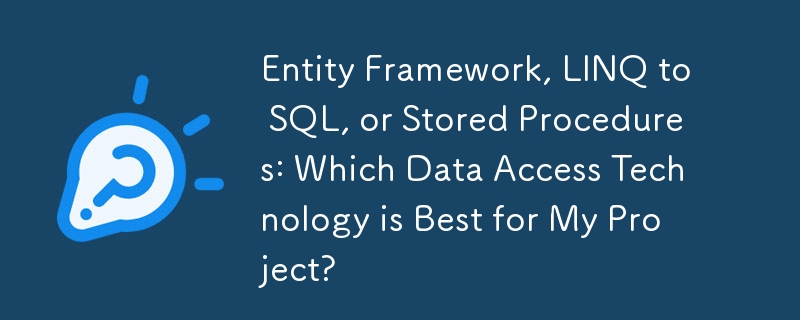

Entity Framework, LINQ to SQL, and Stored Procedures: A Comparative Analysis for Project Selection
Choosing the right data access technology is paramount in software development. This decision directly impacts performance, development time, code maintainability, flexibility, and overall application functionality. This article compares three prominent technologies: Entity Framework (EF), LINQ to SQL (L2S), and stored procedures (SPs) via ADO.NET.
Performance Comparison
Performance varies depending on the task. Basic CRUD (Create, Read, Update, Delete) operations generally show comparable speeds across all three. However, for large-scale queries, optimization is key. EF and L2S offer compilation features to minimize database overhead. For bulk updates, raw SQL or stored procedures often prove more efficient due to reduced data marshaling.
Development Speed
EF significantly accelerates development. Its built-in designer streamlines database schema and code model synchronization, minimizing synchronization problems. Stored procedures and raw SQL are less conducive to rapid development, particularly for data modification tasks.
Code Maintainability and Readability
EF enhances code maintainability. Its relationship modeling minimizes the need for manual joins, resulting in cleaner, more understandable code. This leads to fewer errors and easier maintenance compared to SPs or raw SQL.
Flexibility and Scalability
Stored procedures and raw SQL provide greater flexibility, allowing for easier implementation of complex queries and native database features. However, maintaining synchronization between stored procedures and application code can be more demanding.
Recommendation
Weighing the pros and cons, Entity Framework generally offers the most advantages over LINQ to SQL and stored procedures. For new projects, EF's improved SQL generation, maintainability, and development speed make it the preferred choice.
A Hybrid Approach
While EF is generally recommended, a hybrid approach leveraging stored procedures and raw SQL for specific tasks can be beneficial. Bulk operations and highly complex queries often benefit from the flexibility of stored procedures. This strategic combination optimizes performance, maintainability, and overall application functionality.
The above is the detailed content of Entity Framework, LINQ to SQL, or Stored Procedures: Which Data Access Technology is Best for My Project?. For more information, please follow other related articles on the PHP Chinese website!




